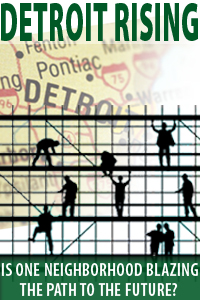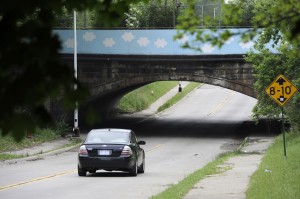Young activist finds energy, challenges in SW Detroit
Two women painted on the wall of Sean Mann’s historic home sum up the story of present-day Detroit.
The murals flanking his dining room window portray the women seen in the city’s official seal.
A weeping woman on the left symbolizes despair. To the right of the window, a woman represents hope. Mann, 31, acknowledges the former, but sees plenty of the latter in the southwest Detroit neighborhood he’s called home for the past three years.
Crime, poverty and drugs are pervasive in Hubbard Farms, a predominantly Hispanic area in the shadow of the Ambassador Bridge that’s more commonly known as “Mexicantown.” Even so, Mann is fiercely proud of the tight-knit community and insistent about its potential to create a living environment that draws young, college-educated professionals back into the struggling city.
As the director of the Let’s Save Michigan, a Michigan Municipal League campaign to redevelop the state’s urban areas, Mann advocates for grass-roots community projects that can help Detroit -- and other cities -- transform into places where highly skilled, highly mobile workers want to live and play.
The Kalamazoo College graduate is practicing what he preaches in Hubbard Farms, where he’s teamed with neighbors to board up abandoned houses, confront crime and slumlords, revive neglected parks and launch a citywide adult soccer league.
|
"The appeal of Detroit to me right now is the fact that there’s growing momentum here,” Mann said during a tour of the neighborhood this summer. “It sounds idealistic, but I do see more people on the ground and more young people moving in. There’s an opportunity for us as young professionals to be part of something that people across the country will be talking about a generation from now.
“What happens here is going to be like what happened in Silicon Valley a couple decades ago, or like other great moments of change, ingenuity and innovation.”
Mann grew up in Livonia, not Detroit. After graduating from Kalamazoo College, he moved to England, where he earned a master’s degree and worked in the United Kingdom's House of Commons.
After returning to the States, Mann immediately plunged into politics, working on Democrat Freman Hendrix’ failed campaign for Detroit mayor in 2005. He worked on other campaigns and later became a policy adviser for the Michigan House Democratic Caucus before joining the Michigan Municipal League in 2009.
Mann moved to Detroit soon after coming home from England. He lived in a loft downtown before relocating to Hubbard Farms, where he owns a 120-year-old, two-story brick home on Grand Boulevard that -- as Mann quickly discovered -- once served as a funeral home. Living in the city places Mann on the front lines of the fight to renew hope in cities such as Detroit.
“If I was going to be involved in public service, it needed to be in a place that resonated with me and that I cared about, and I wanted to see where I could make a difference,” he explained.
There is no shortage of opportunities in Hubbard Farms, where roughly a dozen houses are vacant. Mann and his neighbors -- many of whom originally connected while organizing protests about issues related to the Ambassador Bridge -- began to board up the large empty homes to keep out vagrants and prevent crime and drug use.
(BRIDGE GALLERY: A busy day with Sean Mann and friends)
The houses, once inhabited by upper-middle-class families during the first half of the 20th century, are easy to spot. The boards covering the windows and doors are painted sky blue, with fluffy white clouds.
The same logo adorns a railway overpass on Grand Boulevard, which the neighborhood cleaned and repainted last summer and which now serves as an unofficial entrance into Hubbard Farms.
“The gangs have their tags,” Mann said. “This is our tag to show the neighborhood we did this. It’s like a branding exercise to show what we’re doing and be a visible presence.”
Seeking a more “normal” way to bond with his neighbors, Mann, in 2010, started the Detroit City Futbol League, a co-ed adult recreational soccer league of teams from 22 Detroit neighborhoods, including Hubbard Farms. The weekly games are played at Belle Isle on the same field used in the 1994 World Cup. But the league -- which features players from 18 to 60 years old with wildly varying levels of ability -- is more about fun and community pride than competition. Every neighborhood, for example, has a home bar that hosts a rotating post-game party.
“One of my pet peeves is I have friends who are more familiar with neighborhoods in Brooklyn andChicago than they are in Detroit,” said Mann, who jokes that he and two-thirds of the league had not played soccer since first grade. “I saw this as a marketing tool to help raise the profile of each neighborhood. Great major cities are built on great neighborhoods -- and Detroit has great neighborhoods that people just aren’t aware of.”
Mann says several people have told them they’re moving into the city because of the soccer league. What’s more, the league is an effective community organizing tool. Mann offers tiebreaker points to any team who participates in neighborhood volunteer efforts.
Members of about five soccer teams were digging, weeding and planting on a June Saturday morning at Roosevelt Park, located directly in front of Michigan Central Station, the towering but gutted former train depot that’s become the centerfold of Detroit "ruin porn” widely featured in the media.
Sandra Yu, a 26-year-old program manager at a local nonprofit, worked alongside Mann, her former neighbor and current soccer teammate.
“Sean is a doer,” Yu said. “There are people who talk about ideas, but he gets them to happen. He’s very smart, he knows a lot about different issues and he’s able to bring together people who can make things happen.”
Restoring Roosevelt Park, located in the Corktown neighborhood, is a prime example of the type of project Mann and Let’s Save Michigan are pushing. Community members are investing sweat equity and attempting to raise millions of dollars for a vision that could include a playground, an amphitheater and a skate park. In return, they’re asking the cash strapped city for help on items such as rerouting streets and permitting.
“We’re allowed to do things the city can’t do right now — one of those is to dream big,” Mann said.
(Central Station gets some attention from its owner)
Dreaming big isn’t always easy in Hubbard Farms, where gang tags are seemingly everywhere and Mann casually, if subtly, identifies lookouts for drug dealers manning their assigned posts. Mann’s own home was burglarized shortly after he moved in, and rundown apartment buildings still spawn a variety of criminal activity.
Still, he is proud of the impact he’s made, and determined to helpDetroittap the potential to save itself in the coming decade.
“If I would have gone to (Washington), D.C,. like a lot of my friends, and worked on Capitol Hill, then one time in a career they get a piece of legislation they can say was theirs and they get through the process,” Mann said. “Here, by just showing up and getting involved ... I can see tangible results in my own community. I feel like I can be part of the narrative of the revival of a great American city. That’s a pretty exciting and unique opportunity.”
See what new members are saying about why they donated to Bridge Michigan:
- “In order for this information to be accurate and unbiased it must be underwritten by its readers, not by special interests.” - Larry S.
- “Not many other media sources report on the topics Bridge does.” - Susan B.
- “Your journalism is outstanding and rare these days.” - Mark S.
If you want to ensure the future of nonpartisan, nonprofit Michigan journalism, please become a member today. You, too, will be asked why you donated and maybe we'll feature your quote next time!



